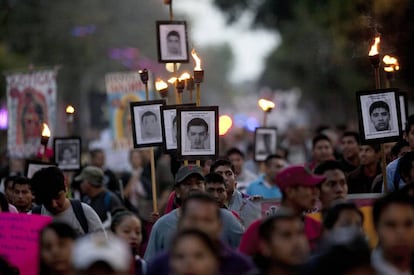Ayotzinapa massacre: leaked report highlights flaws in investigation
State Attorney’s internal audit details confessions under torture and efforts to protect police and army

A leaked audit from Mexico’s State Attorney’s Office highlights important irregularities during the investigation into the disappearance of 43 students in the small town of Ayotzinapa in the southern state of Guerrero in September 2014.

Mexican daily Proceso has published extracts from the report that point to a major official cover up to protect public officials and members of the armed forces. It adds that there is no clear line of investigation and that the priority has never been to find the bodies of the trainee teachers. “As a result, a serious, impartial and effective investigation was never carried out,” the 1,050-page document concludes.
The report is signed off by lawyer César Alejandro Chávez, who oversaw the audit. It demolishes the work carried out over the last two years and could well invalidate the more than 200 volumes of evidence collected as part of the official investigation.
It concludes that the version of events whereby the 43 students were kidnapped by the Guerreros Unidos cartel and their bodies burned at a dump in the nearby town of Cocula is based on confessions obtained through torture and the deliberate omission of the roles of soldiers and police on the night of the events.
So far, only two victims have been identified.
Mexico’s State Attorney’s office will shortly release its report into the 2014 massacre
The audit states that not even the exact number of students who were at the scene at the time of the kidnapping is not known, something that seriously undermines the official version.
The leaked report was prepared by the Visitaduría General, an autonomous, but not independent body, within the Mexican State Attorney’s office charged with overseeing the work of the department.
The Visitaduría had agreed to send its conclusions to the parents of the 43 students by August of this year in line with the recommendations of an international group of experts. When Chávez failed to do so, his boss, State Attorney Araly Gómez did so. Both resigned in October of this year, without citing their reasons for doing so.
The State Attorney’s office confirmed the existence of the Visitaduría’s audit to EL PAÍS, describing it as a “draft”, and adding that it was an internal document that was not for publication and did not comply with the “legal requirements” of the institution.
A serious, impartial and effective investigation was never carried out Leaked report’s conclusion
However, Vidulfo Rosales, the lawyer representing the 43 students, told EL PAÍS that the State Attorney’s office had agreed to send its conclusions: “but hid them because it didn’t want to appear weak and inefficient.”
The audit notes that of the 120 people detained in relation to the disappearance of the students, 95 confessed under torture; it points out 17 “deficiencies” and nine serious irregularities in the case and makes 10 recommendations and 26 instructions to the office of the special investigator appointed by Mexico's embattled President Enrique Peña.
It also agrees with an international commission of experts and the Inter-American Commission of Human Rights (CIDH) that statements should have been taken from soldiers of the 27th Iguala battalion of the Mexican armed forces and that charges should have been brought against federal police for not intervening to protect the students.
The report also notes that the conduct of the 27th infantary division had fatal consequences for the students of Ayotzinapa. At the beginning of December, the head of the 27th Iguala battalion, Alejandro Saavedra, was given a senior promotion.
The audit notes that the official report accepts without question the involvement of the Guerreros Unidos drugs cartel, “putting in secondary level place the responsibility of the Mexican state to carry out a systematic and rigorous search to find the disappeared students.”
It also recommends that what happened in Ayotzinapa be termed forced disappearance and not kidnapping and to act against federal police officers who ignored information about the attacks and failed to act.
Sources at Mexico’s State Attorney’s office say that the institution will shortly release its definitive report into the events of the night of September 26, 2014. The question is what relation it will bear to the version leaked to the press.
English version by Nick Lyne.
Tu suscripción se está usando en otro dispositivo
¿Quieres añadir otro usuario a tu suscripción?
Si continúas leyendo en este dispositivo, no se podrá leer en el otro.
FlechaTu suscripción se está usando en otro dispositivo y solo puedes acceder a EL PAÍS desde un dispositivo a la vez.
Si quieres compartir tu cuenta, cambia tu suscripción a la modalidad Premium, así podrás añadir otro usuario. Cada uno accederá con su propia cuenta de email, lo que os permitirá personalizar vuestra experiencia en EL PAÍS.
¿Tienes una suscripción de empresa? Accede aquí para contratar más cuentas.
En el caso de no saber quién está usando tu cuenta, te recomendamos cambiar tu contraseña aquí.
Si decides continuar compartiendo tu cuenta, este mensaje se mostrará en tu dispositivo y en el de la otra persona que está usando tu cuenta de forma indefinida, afectando a tu experiencia de lectura. Puedes consultar aquí los términos y condiciones de la suscripción digital.








































